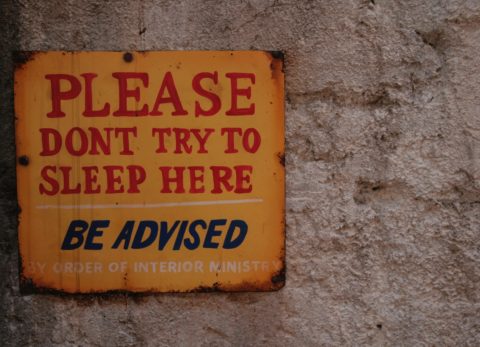Posted on March 14, 2019 by Jenn Zatopek
I’ve been doing a lot of thinking lately about labels and individuals with borderline personality disorder and how I don’t like labels. They reduce people to a series of words, and words, as you and I both know, cannot convey the depth that is the person sitting next to you on the airplane, the school bus, the church pew, the temple or mosque, or the counseling office.
At the heart of the spiritual life, there really are no labels, no “us” versus “them.” There really is only us, human beings doing the best we can, and this way of thinking helps me move beyond labels when I work with individuals in counseling.
Lately, people around me have been saying that folks with borderline personality disorder live well because of their disorder, and I find this is just too reductionistic for me. But I understand their frustrations. I’ve worked with several folks that have this issue, and I can tell you that they are some of the most resilient people that I know. Their histories will stun you with sadness if you have hears to ear and a heart to listen.
Horrendous physical, emotional, and sexual abuse, ongoing neglect, abandonment and flat-out rejection; these facts are part of their stories and yet when I see them alive and sitting across from me, I’m often moved to tears because of their strong desires for connection and healing, living embodiments of hope amidst the darkness of human cruelty. As one counseling professional said to me recently, they are this way for a reason.
According to Dr. Bessel Van der Kolk’s world-changing book The Body Keeps the Score, trauma at its core is failed relationships with other humans, which means that children were not seen or heard by their primary caregivers. For individuals who have been diagnosed with borderline personality disorder, their attachment style is most likely disorganized, which meanstheir primary caregiver was either scared or scary making ti hard for a child to feel safe enough to connect. This dynamic of wanting to approach and avoid a primary caregiver means that some folks as kids did not receive the healthy, supportive, and loving care we all need to live well.
As kids grow up and become adults, they carry on those unhelpful ways of relating to others, and the push-pull dynamic that is often found in someone with this issue can be trying. That’s why doing counseling with someone with this particular issue can be so life-changing and with proper training, the experience can be life giving and nourishing for both the counselor and the client. As a counselor, I get to hold space for the person in suffering and provide an anchor point in their life.
And I have discovered that as I find others in counseling, that as I discover their essence, this act of finding the other not only changes them; it changes me. It opens up my heart, which delights me.
In my own life, I find that what helps is consistency in counseling. If someone with this issue challenges me, takes something I said in a way that wounds them, I listen to them and don’t shut the conversation down. I stay with the discomfort of their pain that I inadvertently caused and I congratulation them on their honesty for speaking up. Often, I’ll make amends to them and ask how I can support them. Counselors are human too and our words aren’t always the right thing for a person to hear. Sometimes, we make mistakes, and it is critical to admit that because it teaches others that our words and actions matter.
I like to remind these folks that I care about them and we will work together to keep that emotional bond going. In essence, I don’t give up on them. They do this because relationship dysfunction was modeled for them. I teach them different ways to get their needs met for connection, like “I know you’re hurting right now, so let’s talk about how you can soothe yourself. You are deserving of that.” Or we work together to come up with a list of activities they can do that will help them to stay calm in the moment of overwhelming panic. Things like being out in nature helps or listening to good music. Being with friends and kids helps too.
Deep down, I believe that all the relationship problems we all face, including folks with the issue of borderline personality, are ways of trying to meet the need for human connection. All of us desire and need to love and be loved. It’s one of the reasons why I remain a Jesus person. There are so many verses in Scriptures that point to the notion of a God who loves the people He created and that He actually delights in us. That word “delight” is something I keep in mind when I work with others. I don’t really fix anyone, but I sure do get to enjoy being with them.
Years ago, when I left my counseling internship, I was inundated with folks who told me that I really saw them. It brings tears to my eyes, even now as I share this with you. One woman in particular had changed from being a quiet lady, a daily hermit, and transformed into a dynamic social person, a real helper to her friends. After our last visit together, she said “Well, now that you’re gone, I’m headed to the community center with my girlfriend. I’m getting out of the house from now on.”
Deeply seen and known by another human being for over two years, our visits of laughter, tears, and hope all mixed up together. Her capacity to know she is worthy of being seen has flourished! And this is from one of the folks who has that pesky label I discussed earlier.
The God we long for wants us so much more than we can ever know. He draws us to himself and in healing relationships, so we can immerse ourselves in that overwhelming truth and let that power transform us. Labels are after all simply useless when you realize that you belong in the heart of a God who loves you and sees you for who you truly are: a glorious mix of beauty and a joy and delight to his heart.





2 Comments
Jenn, I just love your writing! I agree with you on staying way from labeling others too. The Lord has really done work in my heart with this issue, especially this past year, and I’m finding that when I want to box others in, I need to look at my own attitude and remember that it’s really not my place to judge anyone!
March 19, 2019 at 7:25 pmThanks, C. Thankful for your encouragement and sage advice! xo
March 20, 2019 at 6:22 pm